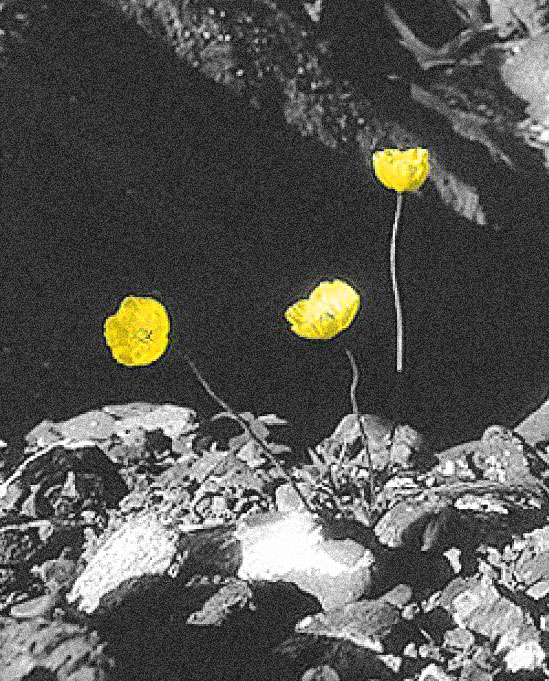
The city people were just too busy to pay any attention to the mudcubs and their fanciful ideas. Theirs was a city full of enterprise, endeavour, efficiency and urgency. A city where targets were met and commitments honoured. Trains ran to time, buses travelled at 12 minute intervals precisely three miles apart, repairers and deliverers told you when they would arrive and then did so.
The city people were so sure of themselves and their effective, economic, enterprising city that they decided to become completely self-sufficient. They decided to build a wall around their city. Not an ordinary wall with gates, windows and doors. No, there were to be no comings or goings through this wall. It was designed to keep the outside, outside.
Outside was what the city people feared. Outside was wildness – exuberant, lavish growth – where life went on with no apparent purpose and to no apparent order. Birds flew where they wished, wild flowers and grasses seeded and grew in every nook and cranny, and the weather – well, there was no controlling the weather!
So the city people built their wall. They built it thick and they built it high. They built it so that it cast the whole city into shadow, so that they could not feel the breath of the breeze on their faces, so that birds, animals, insects and plants were excluded. What they planned for was complete control. So they walked on concrete, worked in artificial light and mass produced their food.
The mudcubs were saddened by the building of the wall. They asked the Clean-Up King about it but he just talked about the storm before the calm. It didn’t seem quite right and wasn’t very encouraging. They had been used to making the long journey to the edge of the great city. They had loved to lie in the long grass feeling the heat of the sun and the vibration of the crickets around them. They had climbed gnarled, knobbled trees bent with age and swum in the sparkling, bubbling, racing waters. It had helped them think about the other beautiful country.
Now all of these pleasures were denied them. All they could see were the grey tones of prefabrication and concrete. The city people, however, were proud of the independence they had created. Their pleasure came from meeting all their own needs by the creation of their own hands and they could see no drawbacks to the isolation in which they were living.
Then it began to rain. No ordinary shower or thunderstorm that passes. This was hard, driving, persistent and torrential rain like the spray of continual machine gun fire. It forced the people off their streets into their homes, offices and factories, wherever there was shelter. It fell without let up. It fell relentlessly.
As time passed the rain began to make the rubbish mountains slither and slide. Avalanches of cans, wrappers, carriers, fag ends, bottles and papers began. The detritus of the rubbish mountains floated down the streets silting up the drains, clogging the overflow pipes. As the sewers blocked, puddles formed in the streets and spread. Water rose to kerb level and began to seep into homes. Rain continued to fall as time began to blur. Tomorrow turned into today and the waters lapping at the city wall continued to rise.
The mudcubs, though, were not in love with the wall. They hated the imprisonment that the wall had imposed. They had longed to break free and now they seized their opportunity. Splashing, stumbling through the rising water they made their way to a large construction site where the foundations for what was to be the third largest building in the city were being laid.
“A hole in the wall! A hole in the wall!” they shouted to the builders who were beginning to climb their cranes in the hope of avoiding the rising tide. One began to operate a demolition ball. With repeated swings it smashed against the city wall making the firmly fixed stone splinter and small pieces fly. Others ran to find explosives.
The explosives were placed in the cavity formed by the demolition ball and were held in place by the mudcubs. The detonator was pressed. Bricks flew. The blast rocked the crane throwing it down into the sea of water. A rain of rubble fell.
Then, as the smoke and dust cleared a large gap appeared in the compact, regular pattern of the city wall. Water began to heave as it moved towards the gap and then poured through tumbling outside the wall and out of the city.
Water drained through the gap keeping the level constant across the city until, finally, the storm began to end. With the ending of the storm, the sewers slowly began to reduce the water level. The gap in the wall was widened and deepened and, in time, the water cleared and the city people could begin to assess the damage.
Now they could see their foolishness and arrogance. Now they demolished the wall leaving only a final layer of rubble to remind them of what they had done.
In time this random collection of stones became covered with wild grasses, weeds and flowers. The countryside that the mudcubs had loved began to invade the city. Now, though, the city people had learnt to welcome the wildness of nature. They knew little of the Clean-Up King and less of the mudcubs but they had taken the first step towards the other beautiful country.
Jonathan Evens
.
